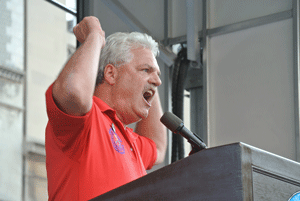Local 1-2 Members to Vote on Tentative Agreement
 August 6, 2012
August 6, 2012
By Marc Bussanich, LaborPress City Reporter
About 10 days ago four people locked themselves in a room to end the Con Edison lockout of 8,500 members of Local 1-2 of the Utility Workers Union of America. According to John Melia, a Local 1-2 spokesman, UWUA’s President Michael Langford, Local 1-2’s President Harry Farrell and Con Ed’s CEO Kevin Burke, aided by Governor Andrew Cuomo, agreed to terms to get Local 1-2 members back to work on the city’s critical energy infrastructure.
At the time Cuomo publicly claimed that severe weather was approaching New York and feared that the city’s power systems were threatened.
When asked if the labor dispute ultimately required Cuomo’s intervention to end the lockout, Melia said, “Yes, because Burke [Con Ed’s CEO] was on an ideological mission to destroy the union and the governor recognized that public safety was being compromised and he had to step in.”
Mail-home ballots were sent out last week to the 8,500 membership and they have to mail them back to the union’s offices by August 15.
Melia said the tentative agreement calls for a wage increase of 11 percent over the term of the four-year agreement, increased healthcare contributions by the members (Melia didn’t know the exact percentage, but noted that it is less than what the company originally sought), and on the hottest item that separated widely both sides during negotiations preceding the lockout—the pension—the tentative agreement calls for the defined-pension benefit to stay intact for current workers.
But for new hires as of July 1, they will be forced to invest in a 401(k)-like plan, supplemented by a Thrift Savings Plan (a federally managed savings plan) where the company will match members’ contributions at 100 percent.
Surprisingly, Melia said that the union believes that the new hires will receive a pension after 30 years that almost equals the payments of a defined-benefit pension plan.
“We don’t think that new hires’ retirement payments will be less than an existing member’s pension payments. We believe that new hires will have the ability to have a funded retirement package that’ll yield the same as a defined pension benefit.”
In fact, Melia said that new hires could potentially end up with a higher retirement package through the new retirement plan.
“It’s certainly mathematically possible that new hires will have more in retirement when you factor in a decent wage, 30 years of work with the company, pre-tax contibutions and the company’s 100 percent matching via the Thrift Savings Plan.”
The question begs, however, why then would the company even offer the 401(k)-like plan if new hires will receive an almost equal retirement to those receiving a pension?
Melia said, “The company had an ideological hatred of the defined pension benefit.”
He explained that one of the biggest gains for the union reached in the tentative agreement is that the $8 billion defined-pension benefit plan cannot come up even for discussion for the next six contracts, about a quarter of century from now.
“I can’t think of a labor agreement anywhere where the company can’t raise the pension issue for 25 years.”
Another item in the tentative agreement, which the union believes will allow the union to grow, is that for every four new hires, three will be union positions.
According to Melia, over the years as Con Edison was hiring new workers it was classifying them as managerial positions, thereby eating into the union’s numerical strength.
Asked if he was happy with the overall outcome, Melia said, “Yes. The union will grow, our members will have stability and the pension issue will not be a source of contention for a long time.”
He added, “All in all, considering what the company wanted, it didn’t get very far. They caused a major disruption, but at the end of the day they did it for nothing. They didn’t anticipate the type of fury they would unleash,” referring to the strong showing of solidarity by the city’s labor movement.
Melia also noted that the company, to help persuade the majority of the 8,500 Local 1-2 membership to ratify the agreement, will offer a $1,200 bonus and then a $600 bonus next year.
marc@laborpress.org



